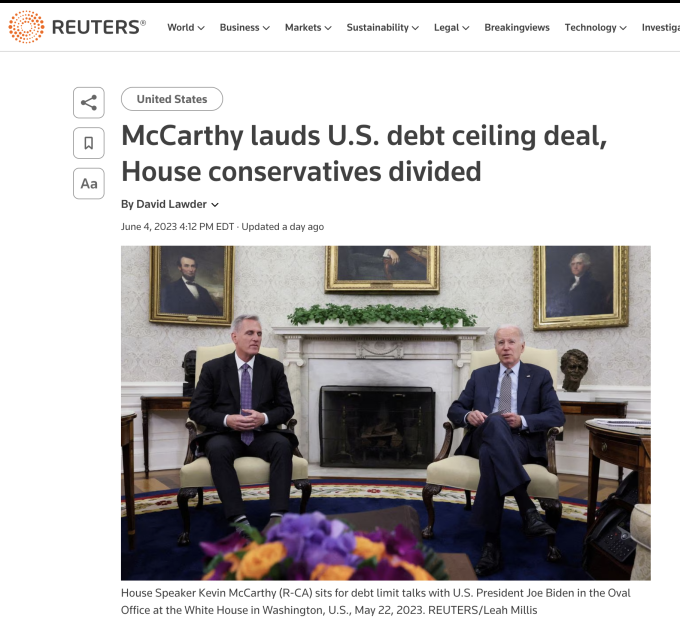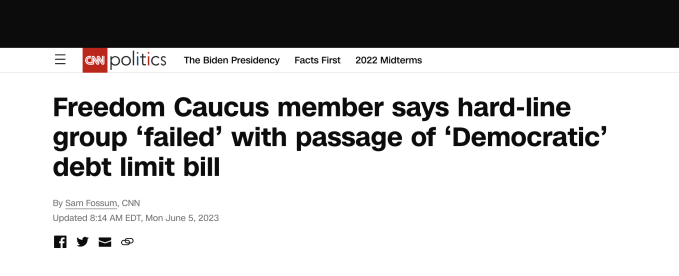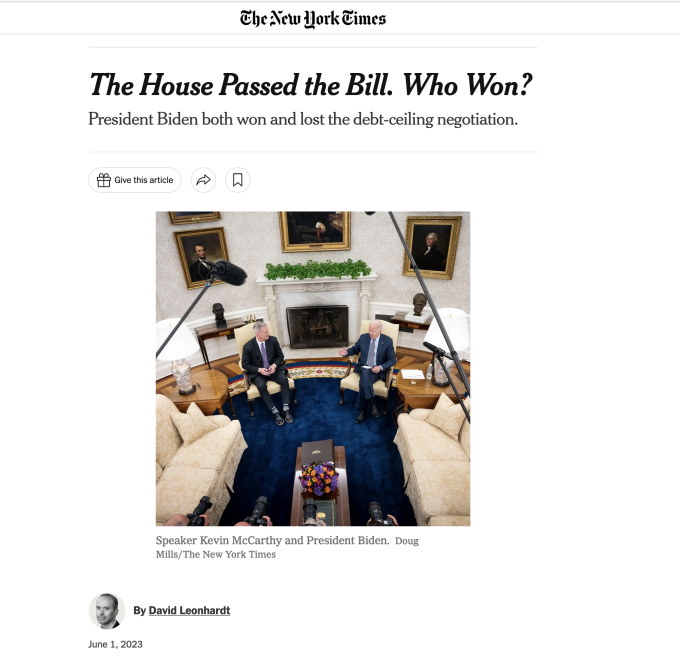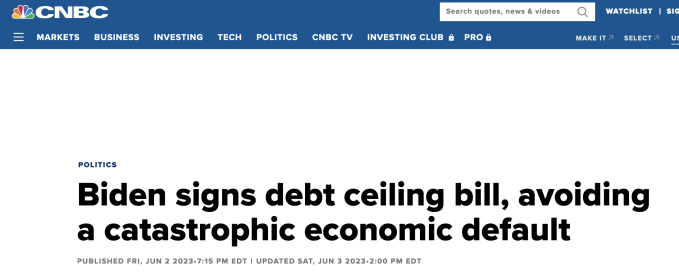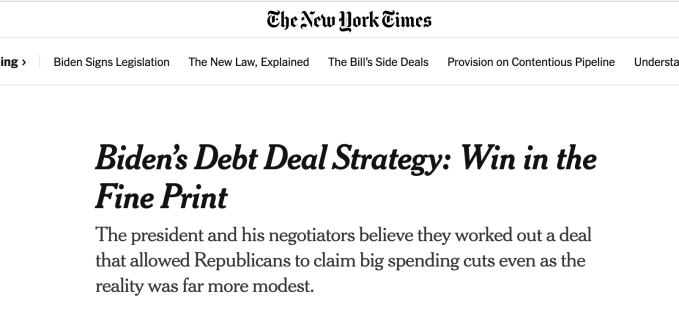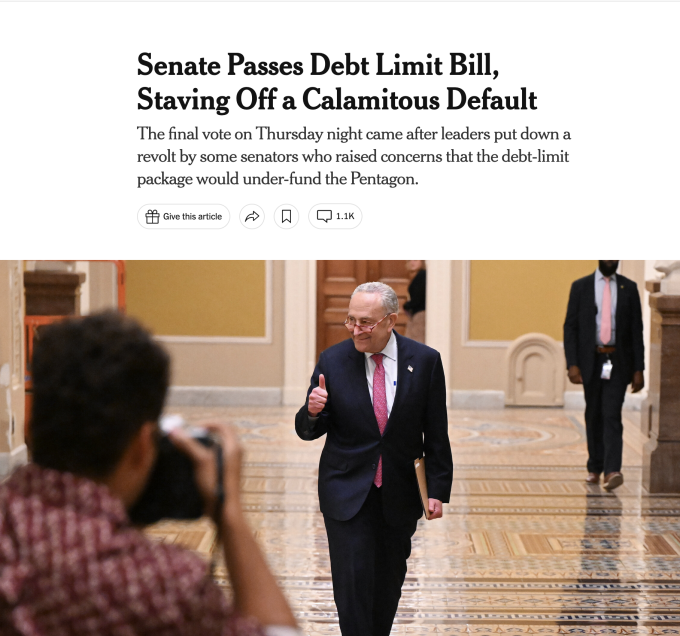June 08, 2023
News and Noise in the Debt Ceiling Coverage
News Takes : Hot Takes | Our Take

Hot Takes
For most of May, coverage of the debt ceiling standoff dominated the news. Lured by structural incentives which reward hyperbole and dramatic writing, most news orgs plotted the narrative as a "race-against-time to avoid doom" storyline which tended to raise the signal ratio of noise-to-news.
Looking back at how reporters framed their debt ceiling stories, a consistent pattern emerges. News orgs pumped up the volume on the political perils of passing a bill and hyped the threat of not doing so.
In our news media system, partisan conflict framing —making stories about who’s winning or losing the endless contest between Democrats and Republicans— is a bad journalistic habit that impacts democracy. While readers learn who’s up in the latest round, they rarely learn about how the policies our representatives enact will impact them, and why representatives may support certain policies. Political stories framed this way are imbued with a “politicians only want to win” savvy cynicism that drives anxiety and generates clicks, so there is an incentive to thoughtlessly repeat this framing despite the impact on democracy.
In stories framed this way, verbs like “battle” and “fight” dominate. Rather than informing readers how the policies imagined by our representatives might solve the shared problems we face, readers learn which of the parties has a “winning” strategy or who got the best of the latest “deal.” Partisan contest framing foregrounds the odds of political gamesmanship and backgrounds the stakes for people.
Take this story by Reuters, which foregrounded the urgency for “Democrats to help pass the measure in the house, which is controlled by Republicans” in order to avoid triggering “economic chaos in the U.S. and global economies.” Filled with phrases like “the battle ahead,” readers learned that elements of the bill were “another win for Republicans.” Yet readers did not learn about the dysfunctional peculiarity of the US’s self-imposed ceiling and about how it has been raised more than 70 times before.
CNN glossed over this important context as well, explaining instead that the “bipartisan deal” exposed how both sides had strategic weaknesses due to the extremes of their parties. Framed this way, readers learn about how internal dynamics impact the odds of the bill passing and of either side winning. We gain perspective on the parties’ political strategy yet learn almost nothing about what’s at stake for citizens.
CNBC also framed the debt-ceiling story as a partisan conflict between “hard-right Republicans” and the White House. They described various “hurdles” that stood in the way of the Bill’s passage and praised “bipartisan” efforts to overcome them. Since the Bill doesn’t touch Defense spending or address the revenue loss caused by Trump-era tax cuts for the wealthy, the reporting did explain how little it would impact the overall deficit. But at no point did it unpack the rationale for or against cutting spending on things like assistance programs like SNAP for citizens suffering from food insecurity. Once again, it gave the odds to the legislation passing while largely ignoring the stakes for people. The result is typical of partisan conflict framing: noise about political strategy drowning out economic news that might inform readers about effective governance.
It's rare for our news media to provide insight on complicated debates about economic policy. As we learned in News over Noise episode 103, reporters who cover economic stories often don’t know that much about economics. Political reporters who frame every story as a zero-sum partisan contest know even less. Few covering the debt ceiling explained the complicated macroeconomic context. Instead, the reporting followed the agenda set by politicians and strengthened the dubious perception that a “bipartisan deal” was good for “the economy” and made “the market” happy. Even The Economist, which titled its take “America’s debt ceiling deal means it should now avoid Armageddon,” chose noisy partisan-divide conflict framing over in-depth economic journalism. But though framing the debt ceiling story as a “politics-as-usual” conflict with apocalyptic urgency generates clicks, readers learn next-to nothing about economic policy and its implications for people.
Our Take
We see the debt ceiling debate as a self-made crisis aided and abetted by poor news coverage, a story in which two unrelated items —paying previously incurred debts and budget negotiations about future spending— were lumped together because the threat of financial default provided leverage. Many legislators tried to emphasize this disconnect and some journalists, following the lead of Treasury Secretary Yellen, pointed out that threatening to undermine the full faith and credit of the United States as a bargaining chip to extract symbolic spending cuts was tantamount to extortion. Had news coverage escaped the pitfalls of partisan conflict framing, this brinksmanship strategy would not have been viable and governance outcome might have been better. But because most coverage defaulted to the habitual “Are Democrats or Republicans winning?” frame, the economic and governance news was drowned out by the noise.
From our perspective, the dominance of partisan conflict framing creates a feedback loop that makes the political strategy more cynical and makes news orgs part of the problem. When news stories report on the odds of legislation passing or on which of the parties is winning and ignore the stakes for governance, democracy suffers. Our democracy needs reporters who are stewards of an ongoing conversation about shared governance more than we need stenographers who amplify the partisan talking points that divide us.
Now that the Bill is out, we’d like to see news orgs look at how it compares to existing law before deciding the winner or loser. Just being “bipartisan” doesn’t mean legislation is good and we need governance reporting that gets beyond partisan contest framing to provide the necessary context for evaluation. Alas, the debt ceiling coverage continues to be dominated by stories - featuring quotes from both sides claiming victory - that have much to say about which side “won” but little to say about the stakes for everyday people. So, when you’re reading broadly around a government story like this and come across partisan conflict framing focused on political strategy and who’s winning, keep looking for stories that highlight the stakes for governance and offer solutions to the problems we all face as citizens in a democracy.
Contact
News Literacy Initiative
newsliteracy@psu.edu

